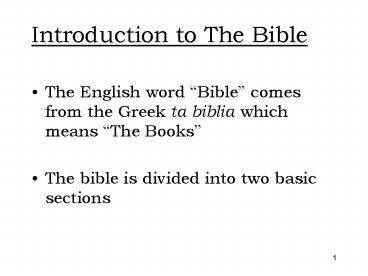Introduction to The Bible - PowerPoint PPT Presentation
1 / 20
Title:
Introduction to The Bible
Description:
Eisegesis = Imposing our own ideas on Scripture rather than on its meaning. ... Eisegesis & Proof-texting. Study & become knowledgeable of the entire Bible. ... – PowerPoint PPT presentation
Number of Views:175
Avg rating:3.0/5.0
Title: Introduction to The Bible
1
Introduction to The Bible
- The English word Bible comes from the Greek ta
biblia which means The Books - The bible is divided into two basic sections
2
The Old Testament
- 39 books in Jewish and Protestant editions
- 46 books in Catholic editions
- Written over a period of about 800-900 years by
various authors
3
The New Testament
- A collection of accounts and writings that
tell the story and the significance of Jesus
life, teachings, death, and resurrection - And tell the story doctrines (beliefs
practices) of the church.
4
The Old Testament
- Torah or Pentateuch Five Scrolls
- Genesis,
- Exodus,
- Leviticus,
- Numbers,
- Deuteronomy
5
History
- Israel living and working out Gods word and
promises that came primarily through Abraham,
Moses and David.
6
Wisdom Literature
- All have a historical context
- Is the voice of reflection and experience.
- Includes persuasion, praise, lament, confession,
suffering - Connect Gods order, his commands to the people
and - the absurdity of going against the grain of his
creation and created order.
7
Prophets
- Major Isaiah, Jeremiah, Lamentations, Ezekiel,
Daniel - Minor Hosea, Joel, Amos, Obadiah, Jonah,
Micah,Nahum, Habakkuk, Zephaniah, Haggai,
Zechariah, Malachi
8
Prophets- Prophecy
- Gods means of communicating to his people
- Prophecy has purpose and calls for action
- Most often God is speaking through the prophet to
his/her contemporaries promising and/or warning.
9
- Usually prophecy is about the immediate future
involves political, economic, social and military
sins, evils. - Gift of prophecy is speaking for God, bringing
Gods character and will to bear.
10
The New Testament
- The Gospels Good News!
- Each of the four gospels show Jesus in a
different light - The gospels are not biographical
- Written to share with people the message about
and of Jesus.
11
Acts
- The account of the Spirit empowered and led
movement of Jesus Christ. - Second book in a series of two
- The primary account of how the message about
Jesus expanded from a local context to a world
wide movement.
12
The Letters or Epistles
- Written to a particular group or person
- Often the letter is to respond to a
question/problem - Intent is to assist the reader in integrating
eternal principle(s) or belief(s) into practical
living.
13
The Non-Canonical Collections
- Catholics refer to them as Deutero-canonical
- Protestants refer to them as the Apocrypha
14
Objective Interpretation?
- We are socially skewed
- We are individually skewed
- We are ecclesiastically skewed
15
Interpreting the Bible
- Need to Understand the Then There and the
Here Now - From a particular culture with a particular
language. - Use of Various Genres
16
Ask the Questions
- What was the Bible saying through God's human
servant to the first hearers or readers of that
message? - How should we apply the passage now?
- Should the message/passage be applied to today?
17
Concluding Thoughts
- The Bible has had the most profound influence on
modern religious thought - It is the most complete history of the ancient
past that we possess. - (Reading the Old Testament, Boadt p.11)
18
- For Jews, Christians Moslems, all or part of
the Bible contains a source and record of Gods
self-communication to the world therefore has
essential and absolute importance.
19
The Challenges of Interpretation
- Exegesis analyze the biblical text and context.
- Hermeneutics Principles of interpretation that
guide exegesis. - Eisegesis Imposing our own ideas on Scripture
rather than on its meaning. - Avoid Proof-texting
20
Avoiding Eisegesis Proof-texting
- Study become knowledgeable of the entire Bible.
- Recognize genres and contexts
- Look for the eternal and the historical
particulars in a text - Respect all scripture
- Use scripture to interpret scripture
- Seek truth
- Pray

















![READ⚡[PDF]✔ Biblical Archaeology: A Very Short Introduction (Very Short Introductions) PowerPoint PPT Presentation](https://s3.amazonaws.com/images.powershow.com/10047354.th0.jpg?_=20240604105)



![get [PDF] Download Rhetoric: A Very Short Introduction (Very Short Introductions) PowerPoint PPT Presentation](https://s3.amazonaws.com/images.powershow.com/10051517.th0.jpg?_=20240610011)









